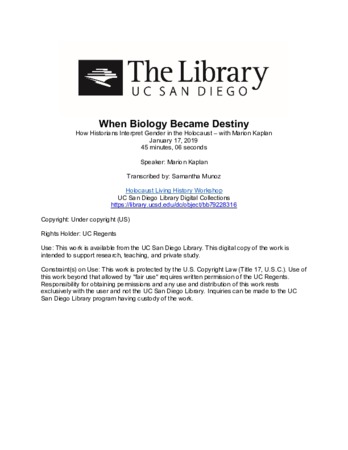When Biology Became Destiny: How Historians Interpret Gender in the Holocaust – with Marion Kaplan
- Collection
- Description
-
Despite the explosive growth of Holocaust studies, scholars of Nazi Germany and the Shoah long neglected gender as an analytical category. The essay collection "When Biology Became Destiny: Women in Weimar and Nazi Germany," published in 1984 and edited by Renate Bridenthal, Atina Grossman, and Marion Kaplan, attempted to raise awareness of women’s experiences under fascism. A pioneering work in every sense, the book explored German-Jewish women’s “double jeopardy” as women and as Jews. In this lecture, Kaplan takes the audience on a historical tour of this research, from the first workshops raising questions, to the first publications providing answers. Since then, the gendered perspective has provided significant insight into our understanding of Jewish life in Nazi Germany and during the Holocaust. Kaplan concludes her talk with a forward look at new areas of research that highlight women’s and gender studies.
Marion Kaplan is the Skirball Professor of Modern Jewish History at NYU and the three-time winner of the National Jewish Book Award for her books "The Making of the Jewish Middle Class: Women, Family and Identity in Imperial Germany" (Oxford University Press, 1991); "Between Dignity and Despair: Jewish Life in Nazi Germany" (Oxford University Press, 1998); and "Gender and Jewish History", co-edited with Deborah Dash Moore (Indiana University Press, 2011). - Event Date
- 2019-01-17
- Speaker
- Recordist
- Personal Name
- Topics
Formats
View formats within this collection
- Language
- English
- Related Resource
Other resource
- Rights Holder
- UC Regents
- Copyright
-
Under copyright (US)
Use: This work is available from the UC San Diego Library. This digital copy of the work is intended to support research, teaching, and private study.
Constraint(s) on Use: This work is protected by the U.S. Copyright Law (Title 17, U.S.C.). Use of this work beyond that allowed by "fair use" requires written permission of the UC Regents. Responsibility for obtaining permissions and any use and distribution of this work rests exclusively with the user and not the UC San Diego Library. Inquiries can be made to the UC San Diego Library program having custody of the work.
- Digital Object Made Available By
-
UC San Diego Library, UC San Diego, La Jolla, CA 92093-0175 (https://library.ucsd.edu/dc/contact)
- Last Modified
2025-04-01
 Library Digital Collections
Library Digital Collections
